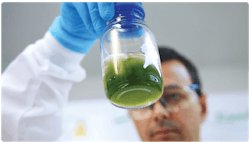Unleashing the power of algae for biopharma
In the landscape of Australian biotech startups, Provectus Algae has emerged as one of the buzziest — and they have a unique pitch for biopharma.
Traditionally, the production of recombinant pharmaceutical proteins for products such as vaccines and antibodies has relied on mammalian cells, bacteria or yeast for cell expression. Instead, Provectus has innovated a proprietary biomanufacturing platform called Precision Photosynthesis that uses algae in cell culture, and unlocks its numerous advantages over other methods. Nusqe Spanton, CEO and founder of the company, says that algae is cost competitive with mammalian cells, and has the unique ability to produce more complex molecules than bacteria and yeast.
“We like to take advantage of those opportunities where algae is differentiated,” Spanton says. “Especially for products that might not see the light of day because of their manufacturing limitations.”
Although algae is abundant in nature and in fact, considered one of the world’s oldest organisms, its value in commercial manufacturing has been limited by the difficulties involved in its growth. But with its platform, Spanton says that Provectus has developed a unique way to use light when growing algae that scales-up well and offers finite control of the cells.
“With the way we use light, we can control the DNA of the cells, and we can switch genes on and off just by changing the type of light we give the algae,” Spanton says. “This is a step change for biomanufacturing.”
The applications for algae in biomanufacturing stretch beyond pharma. So far, Provectus has found applications for its manufacturing platform in multiple industries including food and beverage, agriculture and animal therapeutics. Provectus has formed commercial partnerships to pilot and eventually commercialize high-value products grown with algae.
“We have identified key areas where we see huge potential in algae’s entry point,” Spanton explains.
In pharma, Spanton says that ultimately the company plans to license its platform technology — made with a range of novel bioreactors fit with machine learning, AI and automation controls — to cGMP manufacturers. For now though, the technology is still being validated in partnership with several companies and its lead pharma product is in animal health — a strategy that might help ease the pharma industry into the idea of using algae.
“In pharma, there are fermentation systems that have been used for hundreds of years. And the conservative nature of the industry means that companies often don’t like to take risks,” Spanton says. “So, rather than going head-on into the pharma market, we’re validating in a lower-risk market — the non-human market — so that we can prove the technology rapidly.”
The company’s potential for success hasn’t gone unnoticed by investors. In October, Provectus raised $3.25 million in a round of seed financing. Last year, the company also scored a $250,000 grant from the federally funded Advanced Manufacturing Growth Centre to help commercialize its tech, and all told, has received about $400,000 in government backing.
“The government has been a fantastic supporter of the manufacturing market in Australia,” Spanton says. “The shift in Australia’s political landscape is enabling the growth of biomanufacturing and giving us the opportunity to provide huge solutions in many large and life science markets.”
